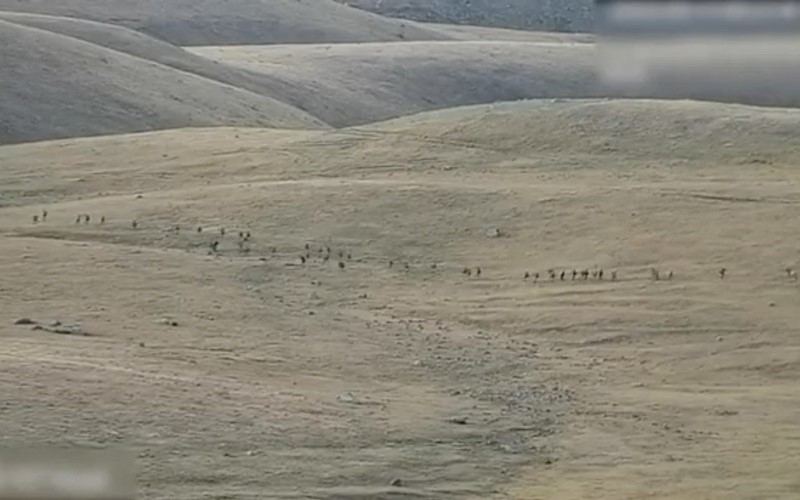Putin calls for calm amid deadliest Azerbaijan-Armenia clashes since 2020

A still image from video, released by the Armenian Defence Ministry, shows what it said to be Azerbaijani service members moving along an unidentified mountainous border area with Armenia, in this still image taken from handout footage released September 13, 2022.
12:19 JST, September 14, 2022
TBILISI (Reuters) – At least 49 Armenian soldiers and 50 Azeri military personnel were killed on Tuesday in the deadliest fighting between Azerbaijan and Armenia since a 2020 war, each side said, spurring Russian President Vladimir Putin to appeal for calm.
Armenia and Azerbaijan, neighboring former Soviet republics, blamed each other for the renewed fighting which began overnight at several points along their border, raising fears of another major armed conflict in the area of the old Soviet Union while Russia’s military is tied up in Ukraine.
Russia has peacekeeping troops in the Azeri-Armenian conflict zone as guarantor of an agreement that ended a six-week war two years ago over the disputed enclave of Nagorno-Karabakh.
Armenia said Azerbaijan had shelled towns near the border including Jermuk, Goris and Kapan, forcing it to respond. Baku said Armenian sabotage units had sought to mine Azeri positions and began the shooting.
It also accused Armenian troops of firing heavy weapons in violation of a ceasefire reached earlier on Tuesday.
Reuters was unable to immediately verify battlefield accounts from either side.
“It is difficult to overestimate the role of the Russian Federation, the role of Putin personally,” Kremlin spokesman Dmitry Peskov told reporters. “The president is naturally making every effort to help de-escalate tensions at the border.”
UKRAINE AND CAUCASUS
Russia’s war in Ukraine has undermined its status as a regional security guarantor, leaving room for Azerbaijan to make more claims, said Laurence Broers, associate fellow at the Russia and Eurasia Programme of Chatham House think tank.
Azerbaijan, which is politically and culturally linked to Turkey, made significant territorial gains in 2020, reclaiming land lost to ethnic Armenians in an earlier war over Nagorno-Karabakh 30 years before.
“Since February, we also have been seeing the collapse of Russia’s reputation as a security patron and a provider of security in the region,” Broers said. “That has created a window of opportunity for Azerbaijan, recalling that the outcome of the second war in 2020 left unfinished business.”
The CSTO, a Russian-led military alliance of former Soviet states that includes Armenia but not Azerbaijan, met on Tuesday to discuss the situation.
Turkey reiterated its support for its ally Azerbaijan, with Defence Minister Hulusi Akar quoted by his ministry as saying that Ankara “will continue to stand by it in its just causes.”
“Responsibility for the provocation, clashes and losses lies with the military-political leadership of Armenia,” the Azerbaijani foreign ministry said. “Any actions against the territorial integrity and sovereignty of the Republic of Azerbaijan will be resolutely prevented.”
BORDER FIGHTING
Armenian Prime Minister Nikol Pashinyan accused Azerbaijan of attacking Armenian towns because it did not want to negotiate over the status of Nagorno-Karabakh, an enclave which is inside Azerbaijan but populated mainly by ethnic Armenians.
He said the intensity of hostilities had declined although attacks from Azerbaijan continued.
Azerbaijan, which accused Armenian troops of carrying out intelligence activity and moving weapons along the border, said its military positions came under attack by Armenia.
Both Russia and the United States called on Baku and Yerevan to observe restraint.
“Whether Russia tries in some fashion to stir the pot, to create a distraction from Ukraine, is something we’re always concerned about,” U.S. Secretary of State Antony Blinken told reporters, adding that Moscow could also use its influence to help “calm the waters.”
Russia’s foreign ministry said the conflict “should be resolved exclusively through political and diplomatic means.”
The Azeri and Russian defense ministers spoke on Tuesday and agreed to take steps to stabilize the situation on the border. Turkish Foreign Minister Mevlut Cavusoglu held talks with his Azeri counterpart Jeyhun Bayramov and called for Armenia to “cease its provocations.”
Charles Michel, president of the European Council, also urged the sides to de-escalate. Michel met with Pashinyan and Azerbaijani President Ilham Aliyev last month in Brussels for talks on a normalization of ties, humanitarian issues and the prospect of a peace treaty over Nagorno-Karabakh.
EU Special Representative Toivo Klaar was set to travel to both countries to support efforts to curb the violence.
France will raise the clashes at the U.N. Security Council, the office of President Emmanuel Macron said.



